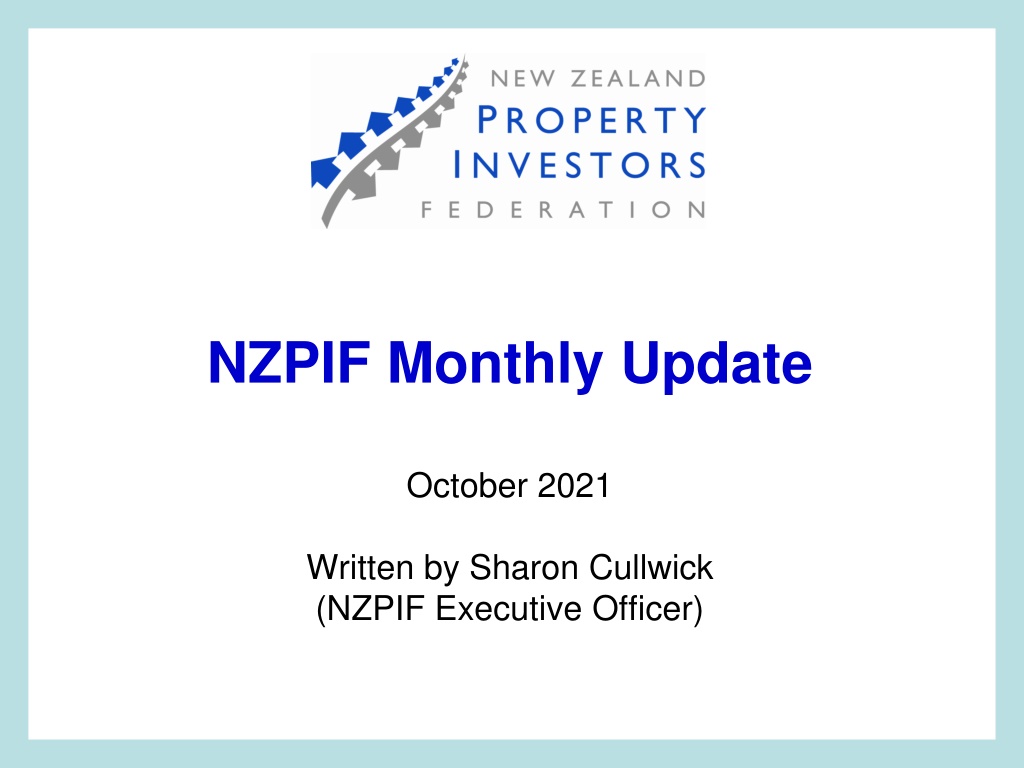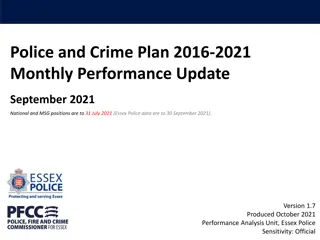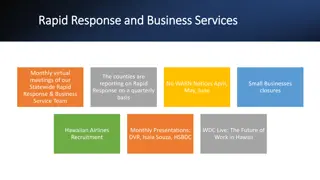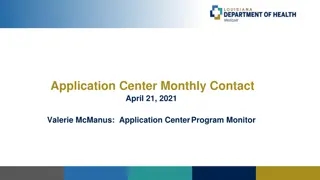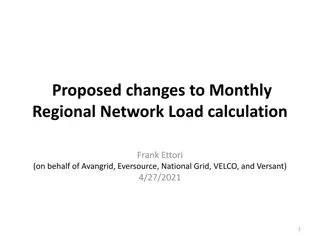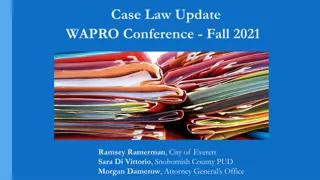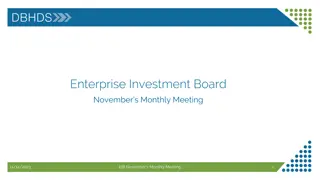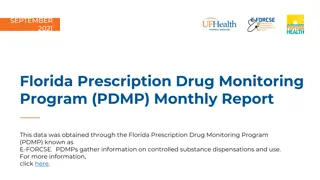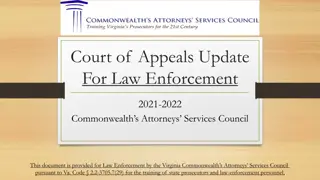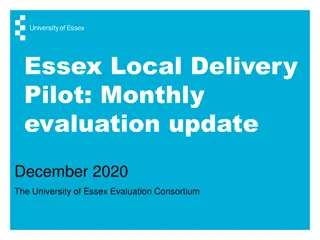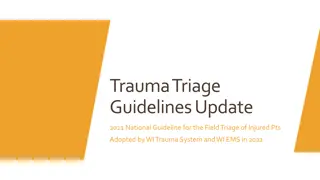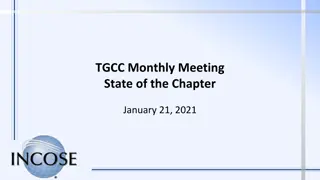Napier NZPIF Monthly Update - October 2021 Summary
The Napier NZPIF Monthly Update for October 2021 covers a range of topics including conference refunds, AGM decisions, important Healthy Homes compliance dates, and extensions for lockdown situations. It also highlights changes in the Residential Tenancies Act for 2020. The update emphasizes the need for landlords to comply with Healthy Homes standards and stay informed about regulatory changes affecting rental properties.
Download Presentation

Please find below an Image/Link to download the presentation.
The content on the website is provided AS IS for your information and personal use only. It may not be sold, licensed, or shared on other websites without obtaining consent from the author.If you encounter any issues during the download, it is possible that the publisher has removed the file from their server.
You are allowed to download the files provided on this website for personal or commercial use, subject to the condition that they are used lawfully. All files are the property of their respective owners.
The content on the website is provided AS IS for your information and personal use only. It may not be sold, licensed, or shared on other websites without obtaining consent from the author.
E N D
Presentation Transcript
Napier NZPIF Monthly Update October 2021 Written by Sharon Cullwick (NZPIF Executive Officer)
Disclaimer NZPIF is a Not-For-profit Organisation and does not provide financial, legal, tax, or accounting advice. Information provided by, on behalf of, or under the auspices of NZPIF is necessarily of a general nature. NZPIF and its officers and agents have no responsibility or liability of any kind to any person for such information. NZPIF recommends you consult appropriate professional advisors before making any investment decision or entering into any investment or transaction.
2021 Conference Refunds Most refunds have now been completed with about 3-4 left to go. Those that asked for a transfer to Manawatu or that didn t reply have been transferred to Manawatu these delegates will receive and email advising them of this.
NZPIF AGM was held on mid October The notion to increase capitation was passed. From $57.50 to $60.00 per member. Pass this onto your respective committees as they may decide to increase membership fees.
Healthy Homes important dates From 1 December 2020 (was 1 July 2020) Landlords must include a statement of their current level of compliance with the healthy homes standards in any new, varied or renewed tenancy agreement. From 1 July 2021 Private landlords must ensure their rental properties comply with the healthy homes standards within 90 days of any new, or renewed, tenancy. All boarding houses (except K inga Ora (formerly Housing New Zealand) and Community Housing Provider boarding house tenancies) must comply with the healthy homes standards. From 1 July 2023 All K inga Ora (formerly Housing New Zealand) houses and registered Community Housing Provider houses must comply with the healthy homes standards. From 1 July 2024 All rental homes must comply with the healthy homes standards
HHS Extension for those under lockdown We ve asked for an extension but this will not be forthcoming!! Must show a conscious effort to meet the standards within the time frame.
RTA 2020 Important Dates 12 August 2020 The new provision that certain transitional and emergency housing is not covered by the RTA takes effect. The limitation on rent increases to once every 12 months takes effect. 11 February 2021 Most of the remaining reforms take effect. 11 August 2021 (further delay until Mid 2022) Reforms relating to family violence and physical assault of a landlord take effect. (These provisions may take effect earlier if the Government agrees.)
Summary of the details of newly released interest deductibility rules 29thSeptember - Government released details that came into affect on the 1stOctober!
Whats excluded Main home Farmland. Certain M ori land, papak inga and kaum tua housing, and land transferred as part of a settlement under te Tiriti o Waitangi/Treaty of Waitangi. Emergency, transitional, social, and council housing. Commercial accommodation such as hotels, motels, and hostels (but not short-stay accommodation provided in a residential dwelling). Care facilities: hospitals, nursing homes, hospices, and convalescent homes. Retirement villages and rest homes. Employee accommodation. Student accommodation. Land outside New Zealand.
Previously denied interest deductions may be available when residential property is sold if the sale is taxable (e.g. Brightline), although the deduction may be limited to the gain on sale.
Emergency, transition, social, and council housing If your property is used for emergency, transitional or social housing when you leased it to the Crown (for example, the Ministry of Housing and Urban Development or K inga Ora) or to a registered community housing provider then you can still claim interest deductions. K inga Ora also provides social housing but is not tax exempt. It is therefore proposed that K inga Ora and its wholly owned subsidiaries be excluded from the interest deductibility changes
Short term accommodation The general intent is for both long-term residential accommodation and property that is easily substitutable for long-term residential accommodation to be included in the scope of the interest limitation rules. Includes Short-stay accommodation. The Government is concerned that a carveout allowing owners of serviced apartments to claim interest deductions may lead to the conversion of regular apartments into serviced apartments, which would reduce effective housing supply.
Tax Deductibility IRD and Treasury didn t agree to the changes IRD opposed the changes and wanted to leave the status quo Treasury never had enough time to do a Regulatory Impact Assessment. Legislation has been written 1st October implementation.
What should you do? Ensure your rents are at current rental rates for the property. Use the NZPIF rent checker or use Trademe (don t use the Tenancy Services data) Keep a copy (photo) of how you worked this out to keep the Compliance and Investigation Team happy. Talk to your accountant if you are worried
What are the opportunities? Less competition Wait four years for rents to increase Restructure finance Increase cashflow (Extra features, extra bedroom, parking, minor dwelling) Build new rentals Form Joint Ventures
Bright Line Test Increased from 5 to 10 years Excludes new builds (definition anything with ccc after 27thMarch 2020) Applied to property acquired on or after 27 March 2021 Main homes and inherited property remain exempt. (some changes are occurring for a property that is both own home and a rental). Tax is paid at your income tax rate - up to 39% Already passed via a Bill
Brightline Test Looks at when the property was acquired New builds are subject to a 5 year bright-line. on or after 27 March 2021, and sold within the 10-year bright-line period between 29 March 2018 and 26 March 2021, and sold within the 5-year bright-line period between 1 October 2015 and 28 March 2018, and sold within the 2-year bright-line period.
Brightline Test Treasury wanted to extend this to 20 years. Treasury never had time to work out the difference from 5 to 10 years Expected fiscal gain is $650 million with the 10 years. Treasury expect rents to rise due to this. IRD opposed the 10 years IRD wanted 5 years for new builds Treasury wanted 20 years for new builds Both were worried about the lock-in effect
Things Ive learnt last month Virtual inspections are not approved by the Insurance Council. Compliance and Investigation Team will not penalise those people who have not been able to complete their Healthy Homes Standards due to lockdown and delays in supplies, provided that evidence can shown that an attempt to comply has been made. There is a website called Aratohu Tenant Advocacy this is set up for tenants and has some basic information for landlords and tenants alike.
Things Ive learnt this month Middle Units are no longer insurable as an individual property, this includes if they are an owner occupier property. An alternative would be for one person to insure the block and charge the individuals accordingly. Properties under a body corporate will be ok, as they are combined. If a rental home is rented with a social housing provider it is very hard to get Insurance. The property does not come under a standard rental insurance policy. Family Violence policy has been delayed again until mid 2022.
Submissions I haven t heard when submissions are required from the Reserve Bank on Debt To Income (DTI)
Privacy Commission New guidelines released 10thNovember Only can gather information when you need it. Can no longer get a tenant to fill in an application form when they are not a perspective tenant. Will slow down the process of filling a house Will leave more houses empty in an already tight rental market.
Covid the hot topic You cannot ask your tenant if they are vaccinated. This is a breach of their privacy.
Covid-19 Response (Management Measures) Legislation Bill Basic overview Can be turned on and off as required due to out breaks of Covid-19. Can apply to specific regions and have different dates for individual areas. No tenancy in the area terminates, and every fixed-term tenancy in the area that expires continues as a periodic tenancy. A tenant can get to 60 days rent arrears. Can still terminate due to anti-social behaviour but it may be very difficult. A tenant may choose to stay in a property despite having given notice to leave. A tenant who plans to move in but can t due to an existing tenant in the premises must give the landlord 2 days notice.
Other things NZPIF is working on: Commerce Commission Cartel behaviour Healthy Homes specifically the heating tool and heat pumps RTA changes 90-day notice causing issues with property sales Meth Standards Insurance Council Property managers licensing Debt To Income Restrictions Reserve Bank Interest-only loans Reserve Bank Research in Accommodation Supplement and Income Related Rent Subsidy Family Violence and Assault on Landlord legislation Significant Natural Areas Rental indexing Rental Caps
Napier Thank you
